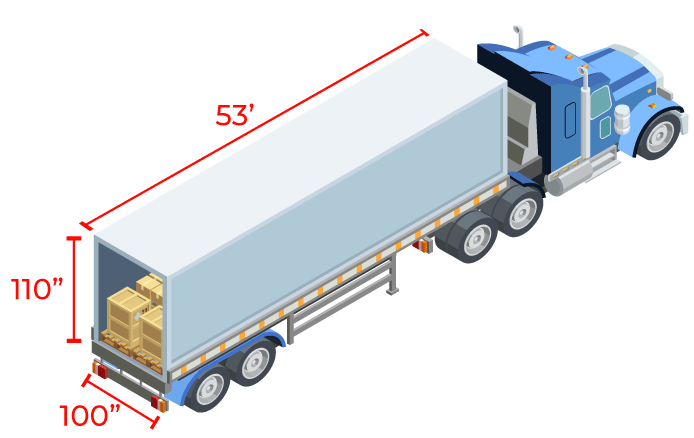Understanding different types of trailers is essential for effective logistics management. One of the most commonly used trailer types is the dry van. This article will explain what dry van freight is, how a dry van trailer differs from flatbeds and reefer units, and why shippers often choose TLI for their dry van loads.

The dimensions of dry van trailers can vary based on factors such as whether the trailer has a roll-up door, a swing door, or what is sometimes referred to as a barn door; for example, some trailers may accommodate freight up to 96 inches tall if equipped with a roll-up door, while others can handle heights of 102 inches. If you have tall or stackable freight and are unsure about the requirements, simply let us know, and we will ensure that we source carrier capacity with the appropriate equipment type you need.
What is Dry Van Freight?
Dry van freight refers to goods transported in an enclosed trailer that protects the cargo from the elements. This type of freight includes a wide range of products, such as electronics, clothing, furniture, and non-perishable food items. Dry vans offer a secure and weather-resistant environment, making them an ideal choice for shippers who need to transport sensitive or valuable cargo.
What is a Dry Van Trailer?
A dry van trailer is a fully enclosed trailer designed to carry dry freight. Typically, these trailers feature solid walls, a roof, and a floor, ensuring protection from rain, wind, and other environmental factors. Dry van trailers come in various lengths, but the standard size is 53 feet. They can carry a maximum payload of about 44-45,000 pounds, depending on the specific trailer design and the weight of the cargo.
How Does a Dry Van Trailer Compare to Flatbeds and Reefer Units?
While dry van trailers are popular, they are not the only option available for freight transport. Here’s how in trucking dry vans compare to flatbeds and reefer units:
- Flatbed Trailers: Flatbeds have no sides or roof, allowing for easy loading and unloading from any angle. They are ideal for oversized or heavy loads, such as construction materials and machinery. However, they offer less protection from the elements and require secure loading to prevent cargo shifting during transport.
- Reefer Units: Reefer trailers are refrigerated units designed to transport perishable goods that require temperature control, such as fruits, vegetables, dairy, and pharmaceuticals. Unlike dry vans, reefers have insulation and cooling systems to maintain specific temperatures. While they offer vital benefits for temperature-sensitive items, they come with higher operational costs due to refrigeration equipment.
Why Shippers Opt for TLI to Haul Dedicated Truck Loads
Shippers frequently choose TLI to handle their dry van loads for several compelling reasons. Our extensive experience in managing dry van freight equips us with the knowledge to navigate the nuances of loading, securing, and transporting various types of cargo, ensuring both safety and efficiency. We pride ourselves on reliability, maintaining a fleet of well-kept dry van trailers that enable us to deliver shipments on time and in optimal condition.
Additionally, TLI offers flexible solutions tailored to our clients’ unique needs, whether they require expedited shipping or regular transport schedules. Our commitment to transparency means we provide real-time tracking and updates throughout the transportation process, allowing shippers to stay informed and effectively manage their supply chains.
Outsourcing dry van loads to TLI also proves to be cost-effective. Our efficient processes, combined with established relationships with carriers, help keep freight rates competitive, ultimately reducing operational costs for shippers. Trucking dry van is a reliable and efficient solution for transporting a wide range of products. With its enclosed design, a dry van trailer protects cargo while offering flexibility for shippers. By partnering together with TLI for their dry van loads, shippers benefit from our expertise, reliability, and cost-effective solutions. If you’re looking to optimize your freight transportation, consider partnering with TLI for your dry van shipping needs.
